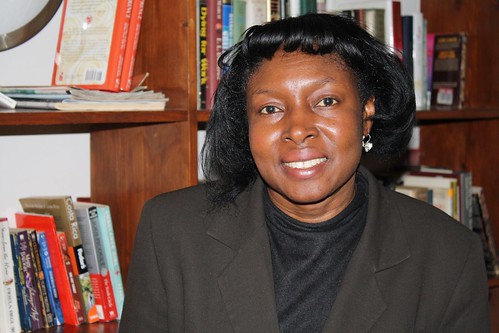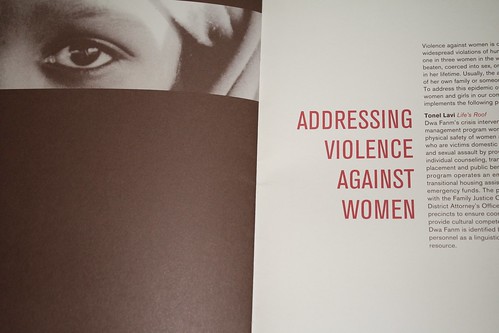In Brooklyn, the highest number of domestic violence calls come from Flatbush, a Caribbean community home the majority of New York’s Haitians and Haitian-Americans. Yet despite household violence topping the neighborhood’s crime list, a stigma attached to domestic abuse in Haitian culture prevents many women from seeking help.
“We get a lot of calls for domestic violence between siblings, husbands and wives,” said an NYPD Flatbush community officer, who did not want to be identified. He confirmed that the bulk of the crime he deals with in the area better known as “Little Haiti” is domestic violence.
According to the Mayor’s Office to Combat Domestic Violence in downtown Manhattan, the City’s Domestic Violence Hotline answered 57,040 calls between Jan. 1 and June 30 this year. In Brooklyn, the majority of domestic violence calls to NYPD hail from the 67th precinct, where most of the New York’s 250,000 Haitian/Haitian-Americans live. According to the Family Justice Center, a governmental program that provides services to domestic violence victims, 39 percent of calls received this year came from foreign-born individuals in Brooklyn.
Recent high-profile cases have spotlighted the issue as well. In 2009, when Haitian-born Mesac Damas murdered his wife and five young children in Naples, FL, the story littered national headlines.
Yet despite attention the issue has received, Haitian women are seeking help less than others in domestic violence situations, says Margarette Tropnas, Executive Director of Dwa Fanm, a Brooklyn-based human rights organization that addresses violence against women in the United States and Haiti. Facing judgment from family members, friends and the church, abused women often fear becoming doubly victimized.
“Its taboo,” Tropnas said. “If you’re assaulted by a stranger, people will say ‘press charges.’ But when it’s [the abuse] in that intimate relationship, people forget that, ‘hey, that’s my sister and she really needs help.’ Often they make the victim feel like the bad guy.”
Advocates at organizations that assist domestic violence victims agree that many Haitian women may hesitate to come forward because of a traditional cultural upbringing, wherein women are expected to be submissive to men.
“Maybe in the culture of the United States women are able to look in the eyes of a partner and speak straight at them,” said Elena Lopez, a counselor at the Brooklyn-based Center Against Domestic Violence, an organization that assists abuse survivors. “Another woman may be looking down on the floor and not even look eye to eye, because some cultures believe that is disrespectful.”
A Demographic and Health Survey conducted by UNICEF in 2005 revealed that 29% percent of Haitian women ages 15-49 believe that a husband is justified in hitting or beating his wife under certain circumstances.
Millery Polyne, Assistant Professor of American Studies at New York University, Ph.D., agreed that machismo in Haiti has historically led to violence against women and children. “They’re living within a patriarchal society [in Haiti], they don’t just shed those ideas once they get off a plane in JFK,” he said. “You do find many women and men who have been transformed. They know the United States has a different culture, a patriarchal society too, but a certain level of legal independence for women. Many women feel empowered by that. But many men don’t prescribe to that way of life, and take it out against their partners.”
Immigration status also deters many domestic violence victims from seeking assistance, due to language barriers, financial worries, lack of knowledge about the resources available, and fear of deportation. Tropnas says that abusers with legal status often manipulate undocumented victims to keep them in a relationship and maintain control.
Yet the Violence Against Women Act (VAWA) of 1994 grant domestic violence victims and their children to apply for green cards without the consent or participation of a spouse through a self-petition. Legal centers such as the Family Justice Center in Brooklyn combine services and provide information to victims about the benefits they can receive without a spouse or the threat of being deported.
“We’re working to provide a safety net and inform people about resources available to them,” Tropnas said. “Many places like the Family Justice Center are now offering a one-stop-shop for services and immigration issues. As people become more educated and more familiar with the system, they come out sooner rather than later.”
Dwa Fanm and other domestic violence organizations align with the philosophy that education will break the silence encircling domestic violence. The organization fosters acknowledgment and education in the community through discussions and projects, panels, documentary screenings, and radio talk shows about domestic violence twice a month on Radio Soleil, a Haitian station in Brooklyn.
“We want to make the issue more visible,” Tropnas said. “If victims are isolated they can’t do anything, so we want to give them information and assistance to empower them.”
Dr. Ingrid Walker-Descartes, who organized and spoke at a panel entitled “Prevention of Family Violence: A Cross Cultural Perspective” for Domestic Violence Awareness month said that there’s no difference between domestic violence victims of one race and another. “It doesn’t matter if you’re Haitian or not, because we’re all human and no human should be treated that way.”
For more information on domestic violence and resources, visit the following websites: Dwa Fanm; www.dwafanm.org; Center Against Domestic Violence, www.cadvny.org; Family Justice Center, www.familyjusticecenter.com; NYC Mayor’s Office to Prevent Domestic Violence, www.nyc.gov/html/ocdv/html/home/home.shtml. If you are a victim of domestic violence, you can get help at the New York City Domestic Violence Hotline: 1-800-621-4673, or 866-604-5350.
(Photo 1: Margarette Tropnas became the Executive Director of Dwa Fanm in April of 2010.
Photo 2: Volunteer-run human rights organization Dwa Fanm, founded in 1999, empowers women in the U.S. and Haiti through education, advocacy, and grassroots programs.)


